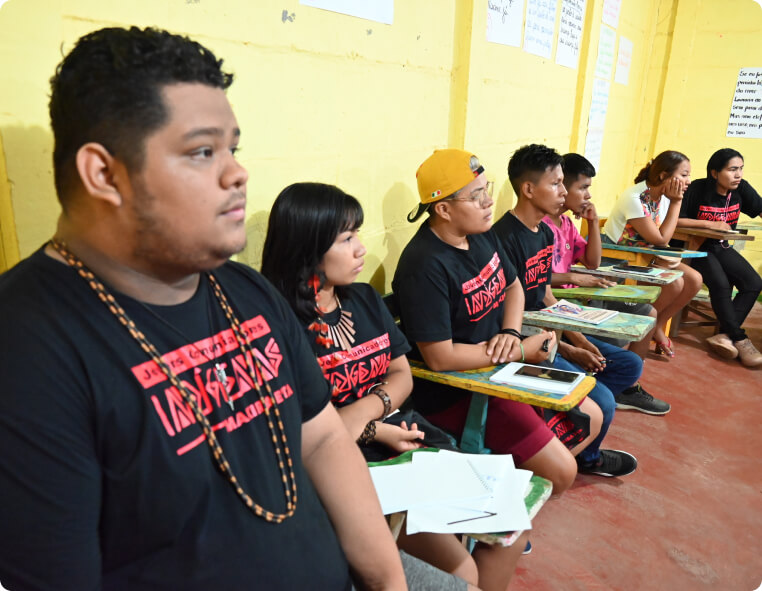


SETA was born from the history of organizations that already work with social transformation in the country and that have national and international reach, in addition to collaboration and direct connection with black, indigenous, education and youth movements. Our Advisory Council brings together names that inspire, guide and represent our commitment to articulating with the public and private sectors and civil society to implement Brazilian legislation that promotes anti-racist education.
is Executive Director of AKOMA Institute
is Executive Director of Baobá Fund for racial equity
is Professor emeritus at the Faculty of Education at UFMG
is exponent of black feminism, Brazilian sociologist and activist and doctoral candidate in Ethnic and African Studies at PosAfro-UFBA
is General Coordinator of the Latin American Campaign for the Right to Education (CLADE)
is member of the Council of the Federal Distance Learning University of Costa Rica and Director of policies, advocacy and campaigns at the Global Campaign for Education
is CEO of BRECHA, one of the founders of the PIPA INITIATIVE and Perifa Connection and part of the youth council of the UN GLOBAL COMPACT Brazil network
is professor and activist of the black movement, she coordinates the Diversity and Social Inclusion Advisory of the Brazilian Association of Black Researchers and was one of those responsible for creating the black quota policy in Brazilian universities
is Executive Director of the Marielle Franco Institute and was a fellow of the United Nations International Decade of African Descent (2015-2024)
is black, autistic woman, pedagogue, audio describer and activist for neurodiversity, and is the current President of ABRAÇA – the Brazilian Association for Action for the Rights of Autistic People
is President of the Brazilian Association of Black Researchers/ABPN (2022-2024) and National Coordinator of the National Consortium of Afro-Brazilian Studies Centers/CONNEABS (2020-2022)
is communicator, activist, DJ and co-founder of Midia India. Comes from a family of indigenous leaders of the Terena people, in Mato Grosso do Sul state, and is a member of the Terena People's Council
We have put together the answers to your main questions into categories. Just click on the subject you are looking for to filter the questions already answered.
Structural racism in Brazil has systemically hindered access to the right to equal and quality public education by black, quilombola and indigenous students. The quality of education that children receive in Brazil is deeply segmented by racial and socioeconomic status. And, today, it is identified that the gaps between white children and black, quilombola and indigenous children, in all basic education indicators, are persistent and more serious for young people aged 11 to 17. Black, quilombola and indigenous children and young people are the most likely to drop out of school, have higher exclusion rates and have lower educational levels. Therefore, they are assigned the less prestigious and lower-paying jobs as adults. Meanwhile, white students internalize the racial inequities they are exposed to in schools and replicate them as adults. When looking at learning indicators, it is also concluded that there are not only more barriers to accessing school for black, quilombola and indigenous children, but that once at school, these children are less likely to access quality education.
The SETA Project seeks to carry out transformative actions based on evidence resulting from studies that help to understand the complexity of racial relations in the country and the resulting problems that need to be faced. In this sense, it foresees a series of studies with national and regional perspectives in its territories of intervention, especially in Amazonas, Maranhão, Rio de Janeiro and São Paulo. The objective is to map the perception of society in general, of education professionals and students about racism, racial inequalities in general and in education, the effectiveness of policies to combat racism, the gaps in tools and methodologies to promote racial equity and successful strategies and good national and international practices that can inspire actions to value diversity and differences and mitigate inequalities, especially in the area of education.
1) Biannual public mapping survey on perceptions of racism in Brazilian society.
2) Biannual focus groups on school communities’ perceptions of racism.
3) Monitoring and evaluation of educational indicators with analysis of education indicators focusing on race, gender and territory.
4) Studies led by the organizations that make up the SETA Project on “indigenous school education”, “quilombola school education”, “educational trajectory of black girls”, “black youth, education and violence”, “impact of secondary education reform on deepening of educational inequalities” and “participatory construction of indicators and diagnosis on quality in education and racial relations”.
All of these productions are/will be made publicly available to assist society in the construction of qualified narratives, based on the portrait of reality, in defense of racial equity in education, in addition to guiding project actions.